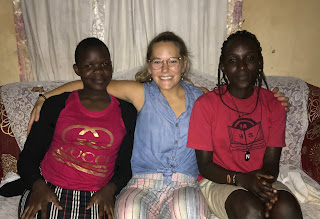The following is an article written for the Uganda Christian University newspaper, The Standard, by our current USP student, Sarah Choate. Hope you enjoy reading what she shared with our UCU community.
I came to Uganda to be a part of USP from Arkansas in the USA. I wanted to come to Uganda because I have some friends who grew up here, and so I had a connection and wanted to see where my friends grew up. Also, I’ve never been anywhere in Africa before, and I’m the first one in my family to reach this continent. I’m thankful for this opportunity to get to see another country for an entire term, which gives me a chance to really learn to understand the culture and customs.
 |
Sarah with her Mukono Host Mother,
Mama Ruth Kareero |
Our USP [staff] took us to Serere for a week-long rural homestays. These homestays are valuable for USP students because we are coming from Western countries and are ignorant of what it’s like to live in a rural setting in Uganda. It’s amazing for us to have the chance to learn about it. I enjoyed small things such as shelling g-nuts with my host family, learning how to get water from the borehole, and trying to carry water on my head in a jerry can. I know that these things are commonplace to many of the students here at UCU, but for me I was learning for the first time how life works in rural Uganda, and many things were new.
 |
| Sarah with her Mukono host sisters |
One thing I found myself reflecting on was the differences between American culture and Ugandan culture. I found that many people I met expressed a desire to travel to America. But I think that life in America, while it is easier in many respects, should not be idealized. I’ve realized that American culture is too fast-paced, and people become too busy to spend leisurely time together. Living with host families in Uganda has reminded me about taking the time to enjoy the small things in life, and that it’s important to make time for other people. Ugandan culture also places a huge value on respect, which is something that American culture is slipping away from. So while I understand that America seems ideal, I’m learning so much about things that make life so rich here, and that should not be undervalued. Even simple things like noticing the flavor of greens, or trying new foods like
atapa, or learning to make chapati are small things that can bring me joy. Sometimes experiences are challenging, like stepping outside of my comfort zone to interact with people who speak a different language than me. I’ve been learning Luganda, but when I was in Serere, I didn’t really speak any
Ateso, which is the local language of that region.
 |
| Sarah pumping water at her rural homestay in Serere |
I’m learning a balance, like any traveler, of pushing myself to do difficult things (such as learn a new phrase in a new language) and enjoying whatever life gives me (like taking morning tea).
All that is to say, I’m glad I’ve come to Uganda. It’s been fun to see a new place and try to learn about a new culture. I would come back to Uganda because I feel that whenever you pour so much of yourself into trying to learn a place, you become invested in it and grow to love it. I’m thankful for everyone who has welcomed me and the other USP students and has made our semester so great so far.




































